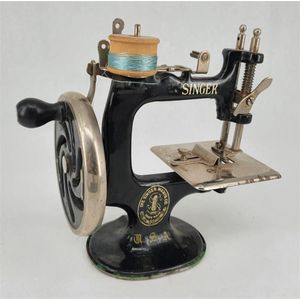
Vintage Singer Sewing Machine Salesman Sample - 17cm Height
A Salesman's sample Singer sewing machine. Height 17 cm.

Vintage Singer Sewing Machine with Carry Case, Serial No. P33398
A Singer sewing machine, with hand wheel, serial no. P33398. Width 46 cm. With carry case.
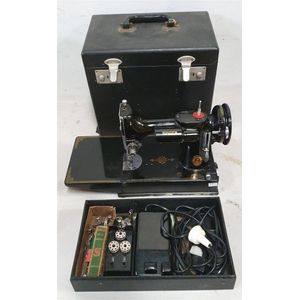
Rare Singer Sewing Machine Cat. No. Cak 6-12 Complete Set
A rare Singer sewing machine, cat. No. Cak 6-12, complete with pedal, in fitted carry case. Width 33 cm.

Vintage Singer Treadle Sewing Machine: 90cm x 44cm x 77cm
Singer treadle sewing machine 90 cm wide, 44 cm deep, 77 cm high closed)

Vintage Singer Featherweight Portable Sewing Machine with Attachments and Manual
Vintage cased Singer portable sewing machine marked for Singer, 'Featherweight,' Convertible model 221, with electric motor, and some attachments, including the original instruction manual, in original carry case.

Miniature Antique Singer Sewing Machine with Surface Rust
Minature antique Singer sewing machine surface rust, 18 cm wide, 16 cm high

Singer Hand Operated Sewing Machine in Dome Top Case
Singer hand operated sewing machine in dome top case, 51 cm x 21 cm, 34 cm high
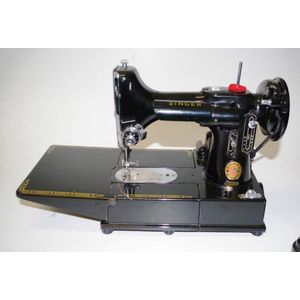
Singer Featherweight 222K Sewing Machine with Accessories and Case
Singer Featherweight 222K sewing machine with accessories and carry case
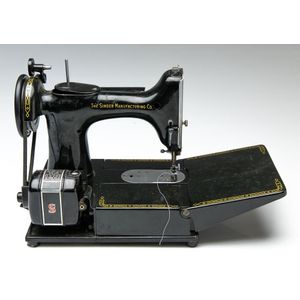
Portable Singer Sewing Machine with Accessories and Manual
A featherweight portable Singer sewing machine, model 222K, in case, case width 36 cm comes with box, pedal, accessories and manual
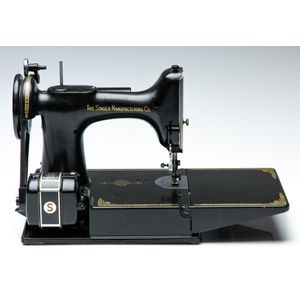
Vintage Singer Sewing Machine, Serial #45713, 38cm Wide
A Singer sewing machine, serial number 45713, width 38 cm
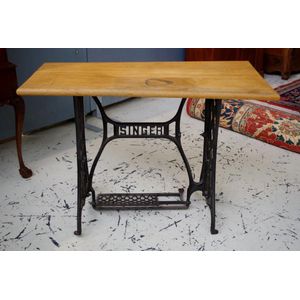
Singer Treadle Sewing Machine Table: 110x56x75cm
Singer treadle sewing machine table 110 cm x 56 cm, 75 cm high
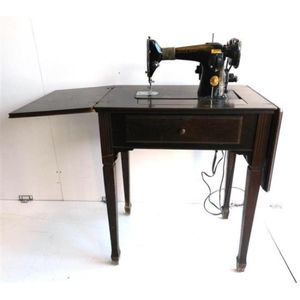
Singer Sewing Machine Table with Single Drawer
A Singer sewing machine timber single drawer table 80 x 65 x 45 cm
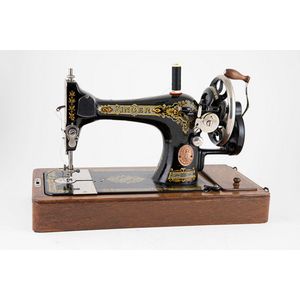
Antique Singer Sewing Machine in Oak Case
Vintage hand operated Singer sewing machine, table top model in domed oak case
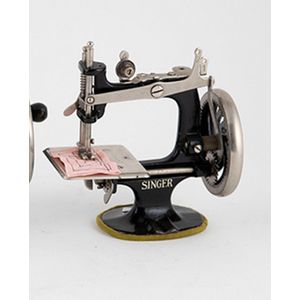
Miniature Singer Sewing Machine with Manual and Clamp
Miniature Singer cast iron no 20 sewing machine, with original instruction manual and table clamp

Antique Singer Sewing Machine - 19th Century
19th century Singer sewing machine 65 cm wide, 42 cm deep, 98 cm high
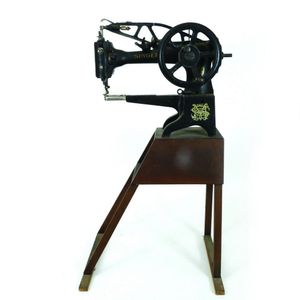
Antique Singer Leather Stitching Machine on Wooden Stand
An antique Singer Model 29 leather stitching sewing machine, On later wooden stand, without treadle drive. As-is.
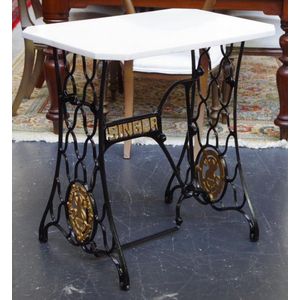
Marble-top Singer sewing machine table
Singer sewing machine table, with marble top, 73 cm x 49 cm, 73 cm high

Antique Handheld Sewing Machine in Timber Case & Manual
Early hand operated portable sewing machine in original timber case with instruction manual, possibly Singer, height 21.5 cm approx
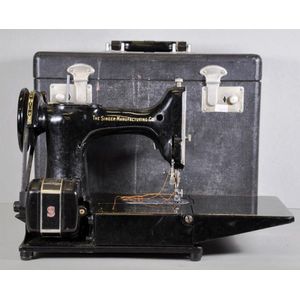
Singer Featherweight 222K with Case and Accessories
Singer Featherweight 222K sewing machine with case and accessories
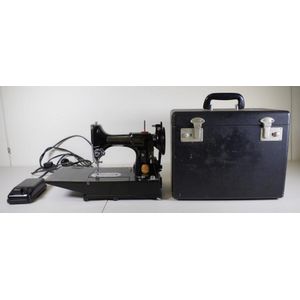
Singer 222K Featherweight Sewing Machine with Case and Accessories
Singer Featherweight 222K sewing machine with case and accessories
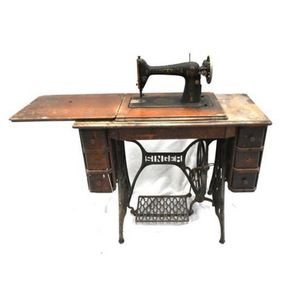
Wrought Iron Sewing Table with Singer Machine
A Singer sewing machine table, wrought iron base, timber top with sewing machine, 74 x 92 x 44 cm

Antique Singer Treadle Sewing Machine Owned by Russell Crowe
A Singer treadle-based sewing machine, circa 1910, the rectangular oak body with a central concealed compartment housing the sewing machine, above four drawers and an iron base with an integral foot pedal, stamped serial number F299796. 76 cm high, 93 cm…

Vintage Singer Sewing Machine in Timber Case
A Singer sewing machine, Catalog. B.U.K.12 E. Motor no. K4152829, made in Great Britain by Simanco, in original timber case
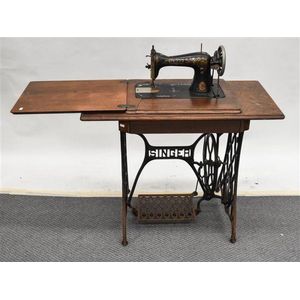
Limited Edition Singer Treadle Sewing Machine
A 1910 Singer Treadle sewing machine, Serial: G6317731, model: 44, limited run of 5000 units, 78 x 91 x 45 cm

Antique Singer Treadle Sewing Machine, Working Condition
An oak Singer Treadle sewing machine c. 1920, machine & belt intact on cast iron base, in working order, 77 x 90 x 44 cm [stowed]

Vintage Singer Sewing Machine with Accessories & Case
A vintage Singer sewing machine cased in box, with motor lubricant & other accessories

Mini Singer Sewing Machine and 4 Attachments Set
A miniature Singer sewing machine and attachments (4)

Victorian Singer Pedal Sewing Machine with Stand
A Victorian Singer pedal sewing machine with the original cast iron stand. 114 cm high, 72 cm wide, 47 cm deep.

Vintage Singer and Novelty Sewing Machine Set
Two vintage miniature sewing machines including Singer together with a novelty sewing machine sharpener

Egyptian-inspired Singer Treble Sewing Machine (1920)
A Singer treble sewing machine c.1920 with Egyptian motif to celebrate discovery of Tutankhamen's tomb

Egyptian Singer Sewing Machine Floor Model
A singer sewing machine floor model with Egyptian motif 52 x 42 x 88 cm

Antique Singer Sewing Machine on Cast Iron Base and Oak Top
An early Singer sewing machine on cast iron base and oak top, 90 x 43 x 76 cm

1950s Singer Sewhandy Child's Sewing Machine in Box
Singer Sewhandy child?s sewing machine in box, English circa 1950s

Gilded Serpent Neck Sewing Machine with Box
A Jones Sewing Machine Co. serpent neck sewing machine, c.1890, the black body decorated with a gilded leaf pattern, complete in box with later Singer decal

Century-old Singer sewing machine table
Antique 'Singer' sewing machine table (antique of the century)

Antique Singer Miniature Sewing Machine - 16.5 cm High
Miniature antique Singer sewing machine, approx 16.5 cm high

British Singer Mini Sewing Machine
Small singer sewing machine., marked made in great Britain. Measures 20 long by 15 cm tall

Hand-cranked Singer sewing machine, made in USA
Made in USA miniature Singer sewing machine, black cast iron hand operated

Child's Hand Operated Singer Sewing Machine - 18cm Height
A child's 'Singer' hand operated sewing machine. Height 18 cm

Vintage Singer Portable Electric Sewing Machine with Accessories
Early boxed Singer portable electric sewing machine. Serial no. 221K1, with manual and accessories.

Hand-Operated Singer Mini Sewing Machine with Clamp
Singer mini sewing machine hand operated, 18 cm wide, 16 cm high. with clamp
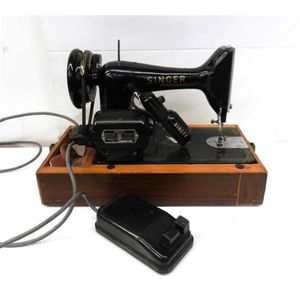

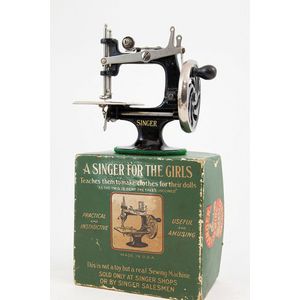

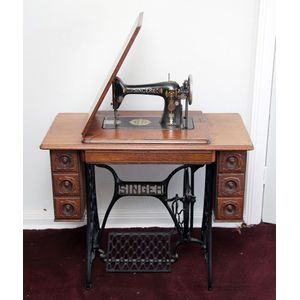

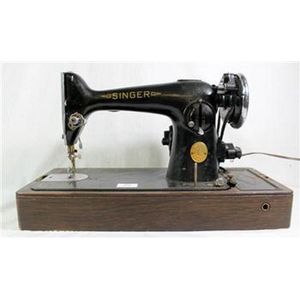

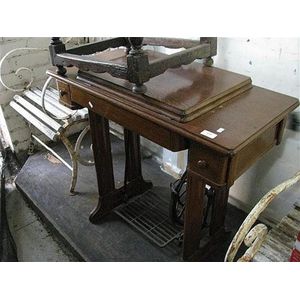
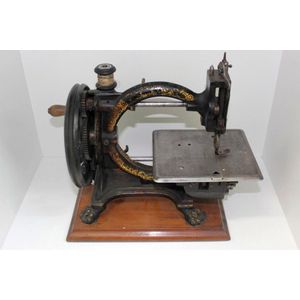
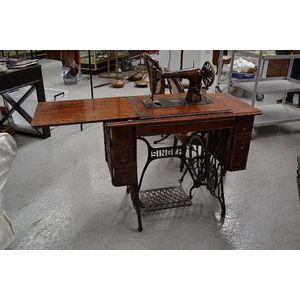




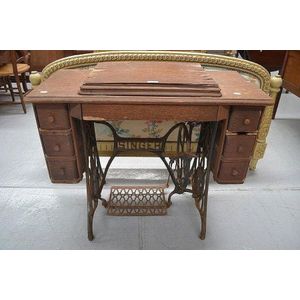

 Loading more...
Loading more...